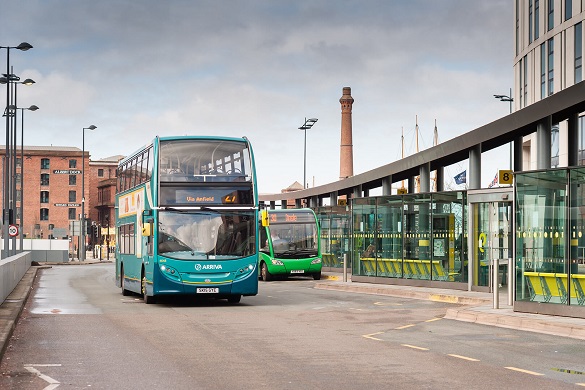A new hi-tech collaboration between data scientists in Liverpool and South Korea is aimed at improving bus journey times and connectivity in the Liverpool City Region.
Researchers will create a ‘digital twin’ (digital replica) of the city region’s transport system to accurately model the effects of different scenarios – such as route changes and fare reductions – to provide a better service for the local community, reduce journey times and ultimately encourage more residents to take the bus.
The ‘digital twin’ will use state-of-the-art data modelling techniques and real-time vehicle location data to help transport leaders achieve greater connectivity across the region, benefitting residents and helping reduce transport inequalities. Hundreds of thousands of people use Liverpool City Region’s bus network each day, with around 82% of public transport journeys currently taken by bus.
It builds on strong links with South Korea’s second city that last year saw Liverpool City Region Mayor Steve Rotheram sign a Memorandum of Understanding (MoU) with the Mayor of Busan Metropolitan City Park Heong-Joon to promote active co-operation in areas relating to digital innovation and smart cities, net zero and clean energy and health innovation.
Dr Patrick Ballantyne, from the University of Liverpool’s Geographic Data Science Lab said: “This is an exciting project which draws on expertise in geographic data science data here at the University of Liverpool alongside urban data expertise from researchers at Pusan National University.
“The project’s innovation lies in applying Big Data and Scenario Modelling technologies in a new area, specifically the recasting and optimisation of public transport networks to more equitable for the residents of Liverpool City Region.”
Steve Rotheram, Mayor of the Liverpool City Region said: “My vision has always been to provide faster, cheaper, safer and more reliable journeys for people travelling across the Liverpool City Region. We’re already starting to turn that vision into reality, taking back control of our buses, capping fares and launching the country’s most sophisticated local trains – which, by the way, are publicly owned.
“Before my re-election, I pledged to use cutting edge digital twin technology to help improve planning and public services across the region. This is our first foray. Working alongside our partners in South Korea and the University of Liverpool, this collaborative new project will help us make better, data-driven decisions to help provide the world class, London-style transport system our residents deserve.”
Professor Jinuk Hwang, Department of Urban Planning and Engineering, Pusan National University said: “We are thrilled to be part of this innovative project which marks a significant step towards smarter, more equitable transport systems. Our expertise in transportation planning and analysis will be pivotal in developing evidence-based strategies to enhance urban mobility in both Busan, Korea, and Liverpool, UK.”
The project is a collaboration between the University of Liverpool’s Department of Geography & Planning, the Digital Innovation Facility, the Liverpool City Region Combined Authority and UK-based technology provider Podaris in partnership with Pusan National University, Sundosoft Inc, Busan Techno Park and Busan Metropolitan City in South Korea.
The project `Big Data Digital Twin of Mass Transit in Liverpool City Region for Smart, Equitable Mobility’ is funded as part of the UKRI Innovate UK UK-South Korea Collaborative R&D programme.
